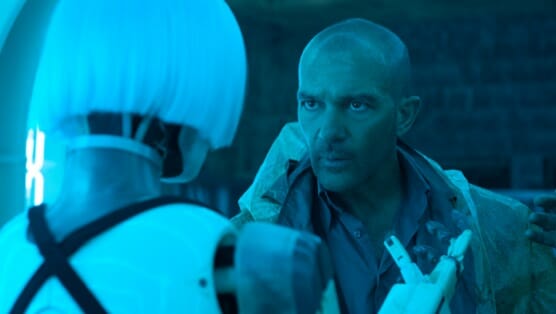Automata

Chalk it up to worldwide economic and socio-political uncertainty or even global warming, but dystopian films—from the Divergent and Hunger Games series to The Giver and The Maze Runner—are having a moment. The latest entry in the genre is the sci-fi robot “thriller” Automata, directed and co-written by Spanish filmmaker Gabe Ibáñez and starring Antonio Banderas. Unfortunately, like some of the malfunctioning robots in the movie, Automata is a clunker.
Some 50 years in the future, the earth is a mess. Thanks to solar storms, much of the planet has turned into a radioactive desert, most of its population wiped out. Even the much-needed rain is toxic. To help humanity survive the hostile environment (as well as with general housekeeping duties), the ROC Corporation has developed Automata Pilgrim 7000 androids. Each robot is created with two security protocols that cannot be altered: first, the Automata can never harm a life, and secondly, the robot is prohibited from modifying itself or other machines.
Automata starts off as a run-of-the-mill whodunit—someone has been tweaking the Automata Pilgrim robots. In a curious choice for an opening sequence, Dylan McDermott portrays a jaded cop who encounters, then shoots, a robot in the middle of self-repair—looking much like a junkie in a dark alley. (Other allegories on humanity’s downfall abound in Ibáñez’s film; even the name “Pilgrim” has significance.) Given the initial setup, one would expect McDermott in a larger role, but he’s only a minor player. His character is almost unnecessary, a distraction that further muddles the plot.
Enter antihero Jacq Vaucan (Banderas), an ROC insurance claims adjuster. The world-weary Vaucan has frequent, recurring dreams—flashbacks to a happy boy frolicking at the beach. He wants a transfer out of the city, to the ocean, or what remains of it. His pregnant wife, Rachel (Birgitte Hjort Sørensen), is reluctant to leave. Their lives are in stasis, in what compounds an already depressing existence.
It’s up to Vaucan to find the “Clocksmith” responsible for changing the robots’ protocols, and he asks scientist Dr. Dupre (Melanie Griffith) for help. Here’s where things spiral out of control—both for Vaucan and the audience. Let’s just say that while Griffith’s doctor doesn’t have much screen time, her robot Cleo does, complete with Griffith’s signature baby voice (other standard androids have sterile Siri voices). What also sets Cleo apart from other robots? Boobs and a wig.